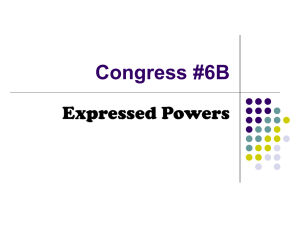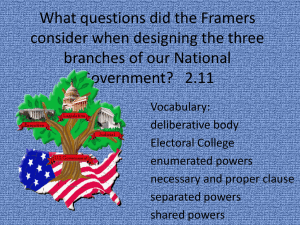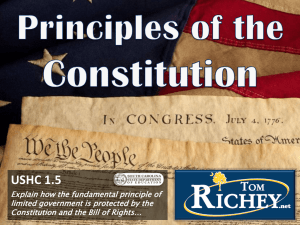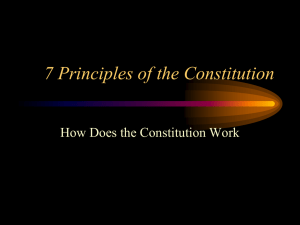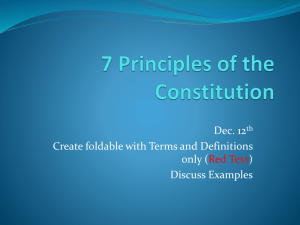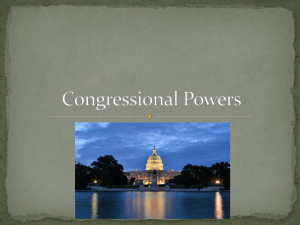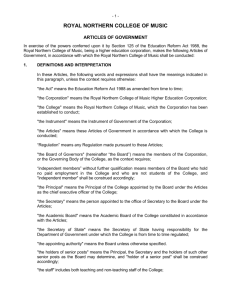Chapter 11: The Scope of Congressional Power
advertisement
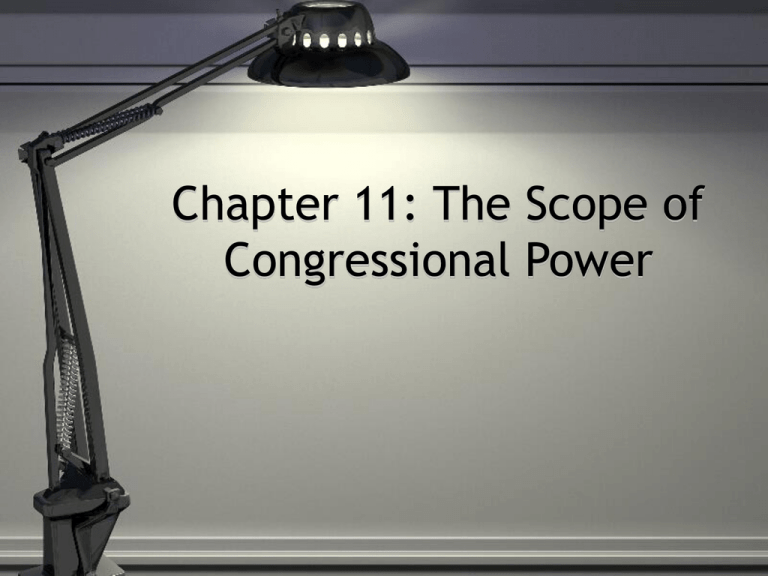
Chapter 11: The Scope of Congressional Power I. Congressional Power A. Three types of power: 1. Expressed 2. Implied 3. Inherent B. Strict v. Liberal Constructionist 1. Strict constructionist: Congress should only exercise those powers: a. expressed in Constitution b. implied powers necessary to carry out expressed powers 2. Liberal constructionist:broad construction of the powers given to Congress a. resulted in a growth of National Power: 1. Wars 2. Economic crisis 3. National emergency 4. Advances in transportation and communication b. Majority of Americans have supported broad interp. Of Constitution II. Expressed Powers of Money and Commerce A. The Power to Tax 1. Purpose of Taxes: a. 90% of gov’t. revenue comes from taxes levied b. tax- charge levied by government on persons or property to meet public needs. 1. Protective tariff 2. licensing 2. Limits on the Taxing Power a. limits on taxing power: 1. tax for public purposes not private benefit 2. May not tax exports 3. Direct taxes must be apportioned among the states a. income tax 4. Indirect tax: one first paid by one person but then passed on to another. a. cigarettes B. The Borrowing Power 1. No limits on borrowing or purposes 2. Deficit financing: spend more than take in and borrow to make up diff. a. public debt: all of the $ borrowed by government over the years and not yet repaid plus interest 3. Balanced Budget Act of 1997: eliminate deficit spending by 2002 a. 1998-2001 gov’t. reported a surplus b. 3 factors ending surpluses: 1. Major tax cuts of 2001 2. Economic downturn 3. Onset of war on terrorism c. 2002 Budget deficit: $159 Billion C. The Commerce Power: power to regulate interstate and foreign trade 1. Commerce Clause 2. Gibbons v. Ogden, 1824: a. brought an extension of federal authority into many areas of American life 3. Limits on Commerce Power a. struck down Gun Free School Zone Act of 1990- U.S. v. Lopez, 1995 b. 4 limits on Commerce Power: 1. Cannot tax exports 2. Cannot favor ports of one state over another 3. Cannot require vessels bound from one state to another to pay duties 4. Could not interfer with slave trade D. The Currency Power- power to coin money and regulate its value 1. Paper $ as currency v. coined money E. The Bankruptcy Power 1. Bankruptcy: legal proceeding in which bankrupt’s assets are distributed among those to whom debt is owed a. frees them from legal responsibility for debt acquired before b. fed. Law is broad and excludes States from process III. Other Expressed Powers A. Foreign Relations Power 1. War Powers a. declare war b. raise and support armies c. make rules governing land and naval forces B. Other Expressed Powers 1. Naturalization 2. Postal Power 3. Copyrights and Patents a. Copyright Office in Library of Congress: good for life plus 70 years b. does not enforce protections of copyrights c. Patent- sole right to manufacture, use, or sell; good for 20 years. 4. Weights and Measures 5. Power over territories and other areas a. can acquire property by purchase or gift b. eminent domain: power to take private property for public use 6. Judicial Powers a. create federal courts b. define federal crimes and set punishments for violation IV. Nonlegislative Powers A. Electoral Duties 1. 12th Amendment: a. House- elects President if no one gets 270 b. Senate- elects Vice-President 1. 2x- 1801 and 1825 2. 25th Amendment- majority vote of Congress to approve V.P. nominee a. 2x- 1973 and 1974 # Office Current Officer 1 Vice President President of the Senate Dick Cheney 2 Speaker of the House of Representatives Nancy Pelosi 3 President Pro Tempore of the Senate Robert Byrd 4 Secretary of State Condoleezza Rice 5 Secretary of the Treasury Henry Paulson 6 Secretary of Defense Robert Gates 7 Attorney General Michael Mukasey 8 Secretary of the Interior Dirk Kempthorne — Secretary of Agriculture Charles Conner (acting)‡ — Secretary of Commerce Carlos Gutierrez (nonnatural)† — Secretary of Labor Elaine Chao (non-natural)† 9 Secretary of Health and Human Services Michael Leavitt 10 Secretary of Housing and Urban Development Alphonso Jackson B. Impeachment- President, V.P., and all civil officers 1. House- power to impeach (to accuse, bring charges) a. majority vote 2. Senate- power to try and convict a. 2/3 vote to convict 3. Chief Justice presides over trial 4. Occurred 2x in Presidential History: a. 1868- Andrew Johnson b. 1998- Bill Clinton 1. Censure: formal condemnation of his behavior c. Richard Nixon- opted to resign on August 9, 1974
